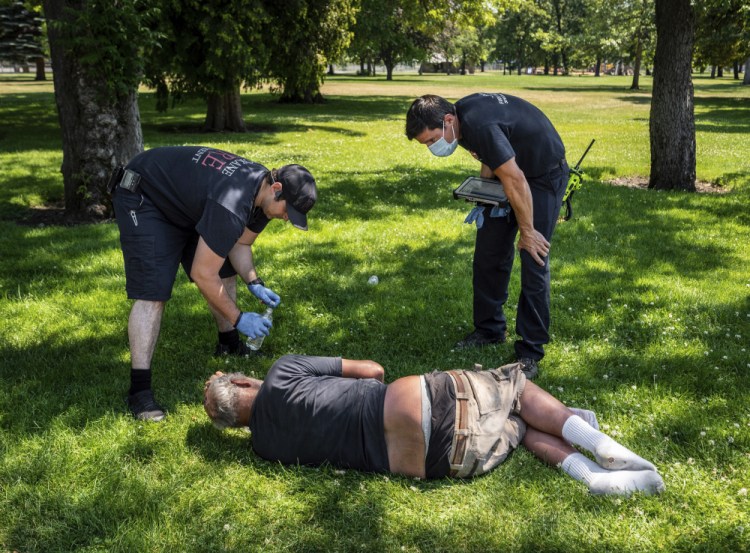VANCOUVER, British Columbia — The grim toll of the historic heat wave that scorched the Pacific Northwest became more apparent Wednesday as authorities in Canada, Washington state and Oregon said they were investigating dozens of deaths likely caused by temperatures that soared well above 100 degrees.
In Vancouver, British Columbia, police said they had responded to more than 65 sudden deaths since the heat wave began Friday. Authorities in Washington and Oregon were investigating about a dozen deaths.
“Vancouver has never experienced heat like this, and sadly dozens of people are dying because of it,” Vancouver police Sgt. Steve Addison said in a statement.
The heat wave was caused by what meteorologists described as a dome of high pressure over the Northwest and worsened by human-caused climate change, which is making such extreme weather events more likely and more intense. Seattle, Portland and many other cities shattered all-time heat records, with temperatures in some places reaching above 115 degrees Fahrenheit.
Amid the dangerous heat and drought that are gripping the American West, crews were closely monitoring wildfires that can explode in the intense weather.
While the temperatures had cooled considerably in western Washington, Oregon and British Columbia by Wednesday, the interior regions were still sweating through triple-digit temperatures as the weather system moved east.
The government’s Environment Canada agency issued heat warnings Wednesday for southern Alberta and Saskatchewan. Heat warnings also were in place for parts of Washington, Oregon, Idaho and Montana.
In Alberta, “a prolonged, dangerous, and historic heat wave will persist through this week,” Environment Canada said in a release.
The very high temperatures or humidity conditions also were expected to pose an elevated risk of heatstroke or heat exhaustion.
British Columbia’s chief coroner, Lisa Lapointe, said her office would normally receive about 130 death reports over a four-day period. At least 233 deaths were reported from Friday to Monday afternoon, she said, adding that coroners are determining whether the record-breaking heat played a role. Like Seattle, many homes in Vancouver don’t have air conditioning.
The King County medical examiner’s office, which covers an area that includes Seattle, said two people died of hyperthermia, meaning their bodies had became dangerously overheated.
In neighboring Snohomish County, three men — ages 51, 75 and 77 — died after experiencing heatstroke in their homes, the medical examiner’s office told the Daily Herald in Everett, Washington, on Tuesday.
Officials in Bremerton, Washington, said heat may have contributed to four deaths in that Puget Sound city.
The death of a worker at an Oregon plant nursery last weekend was heat related, employee safety agency Oregon OSHA said Tuesday.
The man was from Guatemala and had apparently arrived in the United States only a few months ago, said Andres Pablo Lucas, owner of Brother Farm Labor Contractor that sent the man and other workers to the nursery.
The man, whose name was not released, died amid sweltering temperatures Saturday at Ernst Nursery and Farms, a wholesale supplier in St. Paul, 20 miles (32 kilometers) north of the capital of Salem.
Speaking in Spanish, Pablo Lucas said that when workers gathered shortly after noon Saturday, they noticed someone was missing. They began searching and found his body. Pablo Lucas said he didn’t remember the man’s name.
The laborers often have the option to start working around sunrise when it is cooler and can stop around midday, but some want to stay regardless of the heat, Pablo Lucas said.
“The people want to work, to fight to succeed,” he said. “For that reason, they stay.”
The United Farm Workers urged Washington Gov. Jay Inslee to issue emergency heat standards protecting all farm and other outdoor workers in the state with a strong agricultural sector.
In western Washington, the heat led a utility in Spokane to impose rolling blackouts because of the strain on the electrical grid. About 9,300 Avista Utilities customers lost power Monday, and the company said more planned blackouts began Tuesday in the western Washington city of about 220,000 people.
“We try to limit outages to one hour per customer,” said Heather Rosentrater, an Avista vice president for energy delivery.
She said the outages were a distribution problem and did not stem from a lack of electricity in the system.
___
Geranios reported from Spokane, Washington. Associated Press writer Andrew Selsky contributed from Salem, Oregon.
Copy the Story LinkSend questions/comments to the editors.



Success. Please wait for the page to reload. If the page does not reload within 5 seconds, please refresh the page.
Enter your email and password to access comments.
Hi, to comment on stories you must . This profile is in addition to your subscription and website login.
Already have a commenting profile? .
Invalid username/password.
Please check your email to confirm and complete your registration.
Only subscribers are eligible to post comments. Please subscribe or login first for digital access. Here’s why.
Use the form below to reset your password. When you've submitted your account email, we will send an email with a reset code.